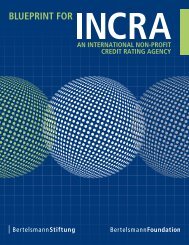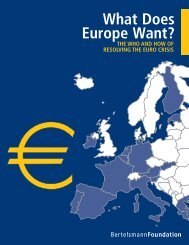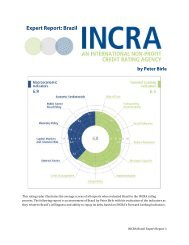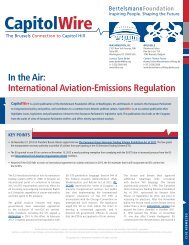BF-FieldManual-FEB13 -3.pdf - Bertelsmann Foundation
BF-FieldManual-FEB13 -3.pdf - Bertelsmann Foundation
BF-FieldManual-FEB13 -3.pdf - Bertelsmann Foundation
- No tags were found...
Create successful ePaper yourself
Turn your PDF publications into a flip-book with our unique Google optimized e-Paper software.
identifying the agents most qualified totransmit those messages. A robust trans-Atlantic energy and climate dialogue willsend strong signals to third countries,such as China and India.1. Reinvigorate the US-EU EnergyCouncil and re-define topics fordiscussion in the Working Groups tocover issues of strategic importanceto both trans-Atlantic partners:The council was launched in 2009 asan official dialogue forum to “promotenew and ongoing cooperation on energysecurity and markets, energy policy,energy technology research.” 16 Yetsince its launch, it has suffered froma growing indifference among US andEuropean leaders alike. In light of thepressing issues outlined above, the USand the EU need a forum that will havehigh policy significance to both parties.The US should use a reinvigorating ofthe council to send positive signals toEurope and to reassert its relevancein international climate and cleanenergy politics. This can be done inseveral ways:a) Include shale gas in the council’senergy security working group: Onearea of discussion should focus on theenvironmental and economic impactassessment of shale gas extraction, asthis is an area of significant interestto both parties with an impact on theincreasingly globalized gas market.International energy experts arepredicting a sharp increase in naturalgas production through mid-century. Yetthe current discussion around shale gason both sides of the Atlantic remainshighly divergent.b) Use the same working group toencourage Europe to build LNG importfacilities for US gas imports: Northernand Mediterranean Europe are preparingfor the import of liquefied natural gas(LNG) from abroad, and diversifyingimport routes with new LNG terminalscurrently under construction in Poland,France and Spain. As Europe has thepotential to become a reliable importerof US LNG, it is in the US’s interestthat European import terminals aredeveloped accordingly (and US exportterminals likewise). In addition, the USshould recognize that the successfulconclusion of a free trade agreement(FTA) with the EU will have substantialstrategic implications for EU energysecurity. Currently, gas exports aresubject to a tedious interagency reviewprocess that makes export to Europeprohibitive. An FTA would expedite theLNG export permitting process at theUS Department of Energy and builda stronger energy trade relationshipacross the Atlantic.c) Use the council as an instrumentto strengthen competitiveness: Themultiplier effect of developing commonUS-EU technology standards forrenewable energy or energy efficiency iswidely recognized. Even though this wasthe initial objective of the US-EU EnergyCouncil, little progress has been made.One way to start this process would beto coordinate and develop a technologyroad map. This would have a positiveimpact on trans-Atlantic trade of energyefficientappliances and batteries, aswell as renewable energy technologies.Particularly with regard to appliances,a trans-Atlantic labeling system couldboost the competitiveness of bothEuropean and American products.Both sides should also agree that onlythe most efficient products should beeligible for public procurement.d) Add a high-level strategy task forceto the council structure: This task forcewould be able to quickly consider issueswith potential severe and immediateeffect on trans-Atlantic relations, suchas the issue of including US airlinesunder a EU-ETS or the impact of the EU’sFuel Directive on shale oil imports fromthe US. The task force should consist ofthe US secretaries of state and energyand the US trade representative, as wellas the EU commissioners of energy,environment, climate action and trade.2. Eliminate tariffs and otherbarriers on trans-Atlantic trade ofenvironmental goods and servicesto promote exports, create jobsand advance green growth andsustainable development:Most such tariffs are low already (around4 percent), and eliminating them wouldhave immediate positive consequencesfor trans-Atlantic investment flowsand market access, jobs and companyprofits. This could be done prior to theapproval of a TAFTA by establishing anEnvironmental Goods List, similar tothe one established under the Asia-Pacific Economic Cooperation (APEC)in September 2012. Such a list shouldinclude core environmental products,such as renewable and clean energies,wastewater treatment technologies,air pollution control technologies,and environmental monitoring andassessment equipment.3. Work closely with the EUon means of creating greatertransparency and accountabilityin extractive industries:In recent years, throughintergovernmental projects such asthe Extractive Industries TransparencyInitiative (EITI), both the US and EUhave been active in reforming themodels of corporate behavior of oil,gas and mining industries at home andabroad, particularly in countries withweak institutions.In the US, the Dodd-Frank overhaul ofthe financial regulatory system containsa number of transformative measuresthat will deeply affect US economicdiplomacy. One of its most innovativepolicy provisions was the Cardin-Lugaramendment (Section 1504), a provisionaimed at making payments made byextractive industries to governmentsabroad and at home more transparent.Together, the EU and US laws have the potentialto transform the way business is done in extractiveindustries and help emancipate developing countriesfrom the so-called “resource curse”.5 4Energy & Climate Change






